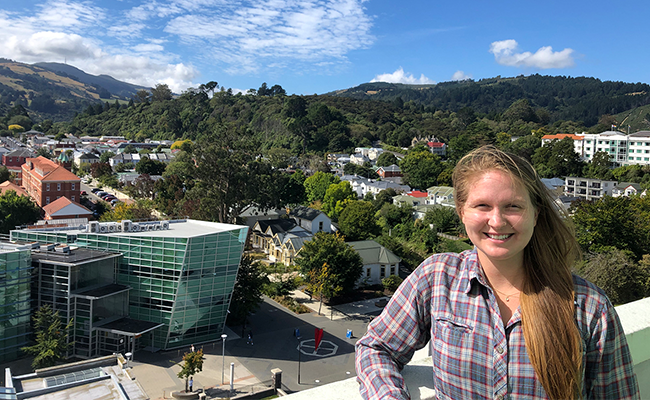
PhD candidate Hannah Kessenich has won a $10,000 scholarship and 50,000 hours' worth of computing time to aid her research on the Ozone Hole.
A University of Otago PhD candidate has been chosen as the only person from Aotearoa NZ to receive a $10,000 Australian scholarship and 50,000 hours of computing time, which she will put towards her research in ozone hole depletion.
Hannah Kessenich, who is doing her PhD in atmosphere and climate through the physics department, applied for funding from National Computational Infrastructure (NCI) Australia late December last year.
NCI then sent her an application form for its inaugural high-performance computing and artificial intelligence (HPC-AI) Talent Programme scholarship, with only two days to go before applications closed.
“I had to do quite a bit of planning for what my next year would look like and what research goals I'd be able to deliver on.”
Having started at Otago in July, it was still early days in her PhD, but her two supervisors helped her pull together her application in time, and she found out recently she had won one of the 10 HPC-AI Talent Programme scholarships available.
“I didn't expect to win, I didn't know how competitive it was. I had definitely had a lot of doubt about myself coming into the PhD after being away from academia for so long,” she says.
“I felt very proud that I received it.”
Kessenich is from the East Coast of the United States. She did her undergrad degree, which had a research component to it qualifying her for PhD level study, at the University of Virginia. She has spent the past five years working at a tech company on the West Coast before arriving in Aotearoa New Zealand to study.
Her undergraduate research was in particle physics, and she spent a lot of time while working thinking about what she wanted to do long-term.
“I really wanted to do something that I felt was a bit more meaningful and related to climate change research.”
She came across the research of her now supervisor, Dr Annika Seppala, who is conducting research on solar influence on the climate system, and decided she would do her PhD at Otago. Initially, Kessenich's research was going to focus on building a new type of ozone detecting satellite and doing atmospheric modelling.
“When I arrived, that actually was very straightforward to get started due to my past computational experience. So I was able to start broadening my scope early on.”
It was while she was doing some background research that she saw some data which didn't align with recently reported ozone hole recovery trends.
“We'd had, in the last two years, the largest ozone holes on record, and I was just looking at those and something wasn't quite sitting right. This past spring, the 2022 ozone hole was similarly large. That's what led me to start investigating in detail what was actually going on.”
Dr Seppala encouraged Kessenich to pursue her investigation further, and she is currently working on a manuscript to publish her findings.
Winning the $10,000 scholarship is enabling Kessenich to attend two conferences later this year, one in Australia and one in the US, which she is pleased about, as it is hard to get funding for international travel as a student.
The 50,000 hours' worth of computing time from the Australian supercomputing facility will be extremely useful.
“When I'm running something like a climate simulation, it takes a lot of computing power and can take weeks to run. It needs a certain amount of what they call CPU hours.
When you are running something of any sort of computation complexity, you need to do that within the limited amount of CPU hours you have been given,” she says.
Receiving these hours will allow her to run her simulations as well as more complicated simulations.
Dr Seppala says the scholarship is a great opportunity for Kessenich to expand her research.
“I'm really excited for her, as is the whole Physics department! It's also pretty amazing that an Otago student was chosen as the only person from Aotearoa NZ to receive the award.”
The additional computational allocation will really help push things forward, and the travel funding of the scholarship Hannah can learn more about advanced computational techniques and connect with other scientists doing computationally heavy research in Australia and Aotearoa NZ, as well as go to a big geoscience conference to present her results, Dr Seppala says.
